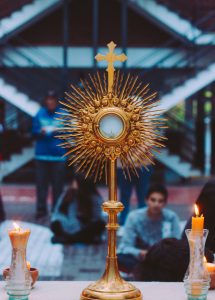
Catechists Become Who You Are
September 13, 2022

The theme for Catechetical Sunday this year is “This is my Body given up for you”, which is directly related to the Eucharistic Revival launched on Corpus Christi Sunday. In the sacrifice of the Mass, we are continually catechized about the sacrifice and suffering of Jesus Christ. As a Theology of the Body Ministry, the Ruah Woods Institute has so much to offer in unpacking this theme. Pope Saint John Paul II (JPII) was famous for saying “Be Not Afraid when love makes demands. Be Not Afraid when love requires sacrifice!”
JPII challenges the understanding of love in our world today and posits a different way to think and respond. He offers suffering, self-mastery, and interiority as a way of love no matter the circumstances. This differs so dramatically from the pleasure held out by the world as the highest good and the only path to happiness.

What is God asking of us as disciples of Jesus and, more specifically as Catholic educators? What does it mean for us to “give up” our bodies for others? How is suffering, self-mastery, and interiority foundational for love? I would like to start with a quote from Gaudium Et Spes that I think will tie all of these questions, and the answer, together. “Man cannot fully find himself except through a sincere gift of self” (GS 24). Let’s first consider suffering.
Suffering
In our world today, our bodies have become meaningless. So, to say that I suffer “for” or suffer “with” another is a confusing statement for many. We have all had some suffering in our lives. Most of us have heard the Catholic phrase “offer it up.” Many of us really don’t understand this sentiment.
It is said that a priest who went to JPII for confession complained about the pain caused by his broken leg. JPII chastised him and told him not to “waste” his suffering. When we suffer, we are more like Christ. When we suffer, we soften our hearts toward others who are suffering. When we suffer, we can experience greater joy on the other side of the suffering. At the time of the suffering, it can be hard to see, but when we offer that suffering for an intention, it can be very powerful.

When COVID hit, we all experienced a tremendous amount of suffering. I am sure that many of you, like me, experienced the loss of someone in your life. During this time of great tribulation, we were unable to go to Mass. The joy of the return to the Eucharist was incredibly profound for so many, myself included. The value of life, the value of mass and receiving the Eucharist had transformed from something I took for granted into a treasure that I was incredibly aware of. An aid to enduring ones’ suffering is the virtue of self-mastery.
Self-Mastery
Why is self-mastery important for love? Every human person was created in the image and likeness of God. This means that we were created to be a gift and to live in communion with others. However, if we do not possess ourselves, if we are “mastered” by our addictions, by our need for temporal pleasure or satisfaction, we cannot give ourselves as a gift. We cannot give what we do not have. We must work on the virtue of self-mastery every day.
Many saints had a practice of daily self-denial. St. Therese of Lisieux, in “The Story of a Soul” wrote “I must stir up in my heart fresh transports of love and fill it anew with flowers. So, each day I made a number of little sacrifices and acts of love, which were to be changed into so many flowers… to form in me a cradle for the Holy Child.” These sacrifices every day will put us on the road to self-mastery and in the position to give ourselves as a gift to others.

When my daughter-in-law was in labor and heading to the hospital to have our first grandchild, I decided that since she couldn’t eat while in labor, I wasn’t going to eat either. As I felt that hunger, I offered my minimal suffering for a safe and healthy delivery. I felt connected to her and her suffering by denying myself food during her time of pain and hunger. It was my interior life that inspired me to master my hunger and to participate in her suffering, even if remotely.
Interiority
Why is it important to have an interior life? It’s really easy to blame others for our unhappiness, to look at the behavior of others and put them down to build ourselves up. It’s really hard to look at our own lives, to analyze and talk with God about our own virtues and vices.

This hard and necessary work is really the key to our own peace and happiness. G.K. Chesterton was once asked to submit an essay on “What is Wrong with the World?”. Chesterton simply replied “I am.” So, I will simply say, deepen your prayer life. Consider a Eucharistic Holy Hour each week. Talk to God about your problems, your graces, your family, your finances. Then simply listen. He has a lot to say if we give him the silence needed to hear Him. Do a thorough examination of conscience before your next confession.
Become Who You Are!
Catechists are a forgotten gem in our church. This group of faithful Catholics give up so much to teach children and adults who desperately need to be “not only in touch but in communion, in intimacy, with Jesus Christ”(Catechesi Tradendae 10). We give up time with our own families, we give up income that we could be making during those hours, and we give of our hearts, our own vulnerability as we share our lives with others. As Catechists, in a sense, we offer ourselves daily or weekly for our students. When we do catechesis well, we possess ourselves and we give ourselves as a gift and in doing so, we become who we are!

We are persons created in the image and likeness of God to be gift. We must acquire ourselves in order to be able to give ourselves as a gift. We must be willing to suffer a little or a lot and offer up that suffering for a better world. JP II said in Catechesi Tredendae “Catechesis then takes on considerable importance, since it is the time when the Gospel can be presented, understood, and accepted as capable of giving meaning to life and thus of inspiring attitudes that would have no other explanation, such as self-sacrifice, detachment, forbearance, justice, commitment, reconciliation, a sense of the Absolute and the unseen… All these are traits that distinguish a young person from his or her companions as a disciple of Jesus Christ.” When we, as Catechists become gift, our students can see this witness and aspire to be a gift to others in their own lives as well.

The Ruah Woods Institute Curriculum is a means to help students come to a deeper understanding of these truths. As students grow up with our curriculum, they are introduced, in an age-appropriate way to many of the themes JPII emphasizes. They learn about the dignity of work, purity of heart and virtue, genuine freedom, true love, authentic friendship. Incredibly important is the understanding of their own bodies as gift. They learn from studying the life of Jesus, who gave himself as a gift, that they cannot fully find themselves “except through a sincere gift” of themselves.
As Catechists when we embrace suffering, work on the virtue of self-mastery and continue to develop our interior lives, we can become what we were created to be — GIFTS — and offer ourselves as gift to our students while continuing to be fed by Jesus as He offers His body for us — ALL of us— in the holy sacrifice of the Mass. This my Body, given for You!

Written by,
Kathleen Cory,
Regional Curriculum Consultant (South) for Ruah Woods Institute
kcory@ruahwoods.org
Share